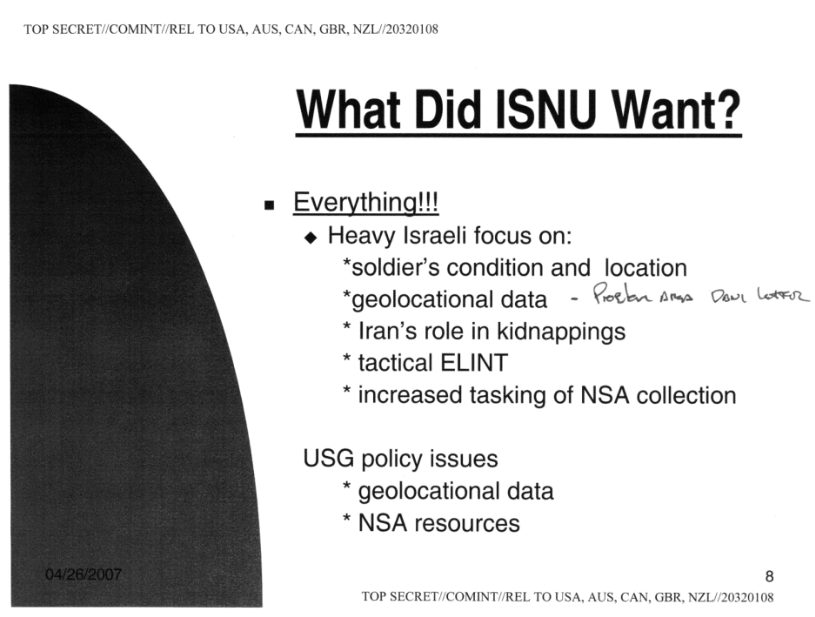A couple of new bombshell leaked NSA documents from the Snowden archive published days ago by The Intercept confirms the extremely close level of cooperation between American and Israeli intelligence services, especially as part of the so-called “global war on terror” since 9/11. The documents reveal the NSA even assisted in an aggressive targeted assassination campaign waged by Israel inside Lebanon, especially during the 2006 Lebanon War.
According to The Intercept’s report — aptly titled “Israel Hated American Ban on Sharing Intel for Assassinations, so US Made New Rules” —the newly unearthed NSA memos reveal attempts to find a legal loophole of sorts on the part of the US intelligence officials which would allow unprecedented information sharing related to a deeply controversial targeted assassination campaign by Israel.
The Intercept report states:
As Israel and the Lebanese militia Hezbollah exchanged blows during their short-lived but devastating 2006 war, Israeli military officials used private channels to pressure their American counterparts in the National Security Agency for intelligence to help assassinate Hezbollah operatives, according to a pair of top-secret NSA documents. The NSA was legally restricted from providing such information but, after Israeli officials asked for an exemption, U.S. intelligence officials decided on a new framework for information-sharing.
Essentially the Israeli SIGINT National Unit (ISNU), considered “Israel’s NSA”, convinced their US intelligence counterparts to circumvent US laws and procedures regarding intel sharing with allied nations.
“To ISNU, this prohibition [on sharing data for targeted killings] was contrary not only to supporting Israel in its fight against Hizballah but overall, to support the US Global War on Terrorism,” the NSA memo stated.
“ISNU’s reliance on NSA was equally demanding and centered on requests for time-sensitive tasking, threat warning, including tactical ELINT” — electronic intelligence — “and receipt of geolocational information on Hizballah elements,” the NSA official wrote. “The latter request was particularly problematic and I had several late-night, sometimes tense, discussions with ISNU detailing NSA’s legal prohibition on providing information that could be used in targeted killings.”
From a NSA presentation on Israeli intelligence sharing published by The Intercept:
“Even with his full understanding of the US statutes, [ISNU Commander] BG Harari sought assistance from NSA for an exemption to this legal policy. To ISNU, this prohibition was contrary not only to support Israel in its fight against Hizballah but overall, to support the US Global War on Terrorism.”
The Intercept concludes in its analysis of the leaked memo that NSA officials found a way around the official US prohibitions, though the precise extent of its help in the Israeli targeted assassinations campaign remains undisclosed:
The account goes on to suggest that the NSA ultimately reached a compromise with its Israeli counterpart by working with the Office of the Director of National Intelligence, or ODNI, the cabinet-level office that oversees U.S. intelligence efforts. “In the end,” the article states, “a framework was decided upon by ODNI that defined the parameters and methods of what could and could not be shared with the Israelis.” The documents do not give details of this framework.
The NSA memo recorded the Israeli reaction as follows: “Throughout all of my discussions – no matter what the tone or subject – ISNU stressed their deep gratitude for the cooperation and support they received from the NSA.”
From a leaked NSA presentation on Israeli intelligence sharing published by The Intercept:
Interestingly, one leaked NSA presentation referred to ISNU as “NSA’s most valued third party partner,” but simultaneously acknowledged “high anxiety” among the Israelis as they had “heavy reliance on NSA for support”.
One slide reads “What Did ISNU Want? Everything!!!” and lists as “issues” that might prove legal roadblocks with the US government sensitive “geolocational data” and “NSA resources” — both of which suggest US officials knew Israel could use data to potentially track Americans.







